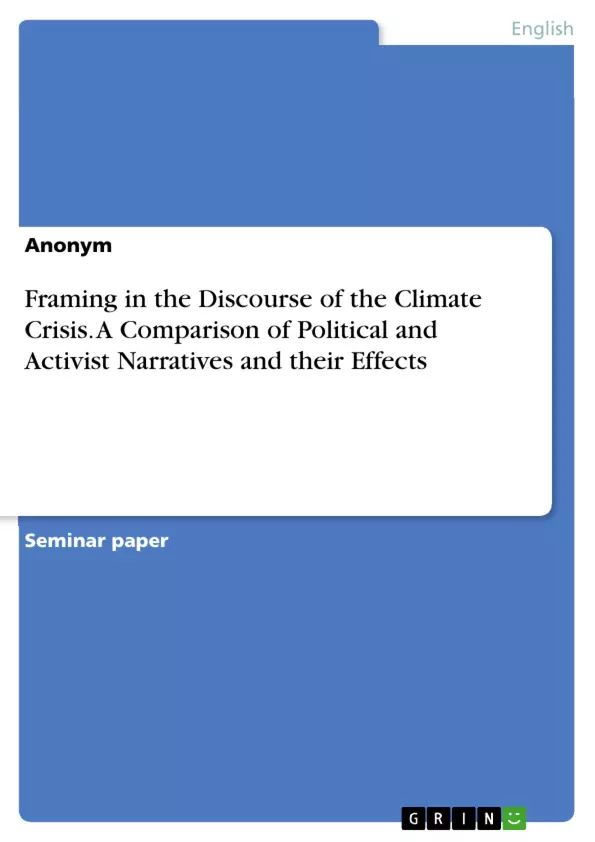The primary purpose of this research is to analyze how framing devices of the climate crisis are used by political figures and climate activists, and how their different applications can influence the overall tone of a speech. The thesis argues that framing is a powerful tool in shaping public perception and urgency regarding climate change. Understanding the differences in framing between politicians and climate activists is important for several reasons. It sheds light on how different groups influence public perception and the overall climate discourse, and provides insights into the effectiveness of various rhetorical strategies in mobilizing support or opposition.
The paper is structured as follows: First of all, there will be theoretical background about discourse analysis in general and framing strategies in particular. The issue of the climate crisis, which is subordinate to the strategies, will also be addressed, as well as the use of frames in the discourse. In the following analysis-part of the paper, selected speeches by activists and politicians are examined. By comparing their rhetoric, in particular the use of frame strategies, the aim is to highlight the importance and complexity of these strategies for the public politic discourse, particularly how framing influences the discourse surrounding the climate crisis and its broader implications. This should enable a deeper understanding of how language is used in politics, discourse and the public sphere but especially in terms of the global climate crisis.
Inhaltsverzeichnis (Table of Contents)
- Chapter 1: [Insert Chapter 1 Title Here]
- Chapter 2: [Insert Chapter 2 Title Here]
- Section 2.1: [Insert Section 2.1 Title Here]
- Section 2.2: [Insert Section 2.2 Title Here]
- Section 2.3: [Insert Section 2.3 Title Here]
- Chapter 3: [Insert Chapter 3 Title Here]
- Chapter 4: [Insert Chapter 4 Title Here]
- Chapter 5: [Insert Chapter 5 Title Here]
Zielsetzung und Themenschwerpunkte (Objectives and Key Themes)
This work aims to [Insert concise description of the work's objectives and goals]. The text explores several key themes, providing insights into [briefly mention the overall subject matter without revealing conclusions].
- Theme 1: [Insert Key Theme 1]
- Theme 2: [Insert Key Theme 2]
- Theme 3: [Insert Key Theme 3]
- Theme 4: [Insert Key Theme 4]
- Theme 5: [Insert Key Theme 5]
Zusammenfassung der Kapitel (Chapter Summaries)
Chapter 1: [Insert a concise summary of the main points of Chapter 1, focusing on themes and arguments. Avoid spoilers.]
Chapter 2: [Insert a concise summary of the main points of Chapter 2, focusing on themes and arguments. Avoid spoilers.]
Chapter 3: [Insert a concise summary of the main points of Chapter 3, focusing on themes and arguments. Avoid spoilers.]
Chapter 4: [Insert a concise summary of the main points of Chapter 4, focusing on themes and arguments. Avoid spoilers.]
Chapter 5: [Insert a concise summary of the main points of Chapter 5, focusing on themes and arguments. Avoid spoilers.]
Schlüsselwörter (Keywords)
This text focuses on the key concepts of [Insert main keywords and focus topics. Include terms such as research focuses, important themes, and core concepts. For example: inclusive and exclusive education, empirical research findings, BiLieF project].
- Quote paper
- Anonym (Author), 2024, Framing in the Discourse of the Climate Crisis. A Comparison of Political and Activist Narratives and their Effects, Munich, GRIN Verlag, https://www.grin.com/document/1515193



